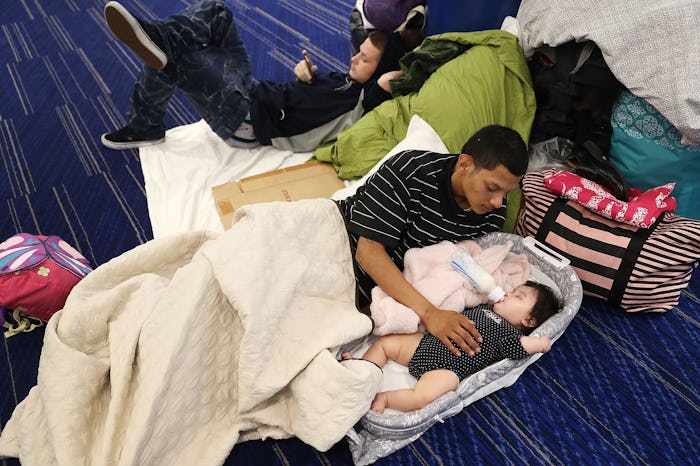Life

5 Emergency Preparedness For Babies Tips, Now That Hurricane Season Has Arrived
Last year's deadly hurricane season is an important reminder that every family benefits from emergency preparedness. Whether it's wildfires or earthquakes, tornadoes or a flash flood, having a plan of action can help protect your family from extreme weather. Sadly, a lot of people don't have plan for emergency situations until something unfathomable happens. Since September is National Preparedness Month, staying on top of emergency preparedness for babies doesn't have to be complicated. The time it takes to put together a plan may just save some lives.
According to the Ad Council, 69 percent of Americans don't have an emergency plan in place. As a parent, I know how many things my kids require on a typical day, let alone after a natural disaster, so I know that being as prepared as possible is the key to navigating dangerous situations. Parents advisor Irwin Redlener, M.D., director of the Center for National Preparedness at Columbia University, says that even though "disasters are rare, prepping for them is one of those crucial 'just in case' precautions, like having smoke detectors." In other words, even if you never use your family emergency plan, it's important to have one in place.
The Federal Emergency Management Agency (FEMA) has detailed preparedness lists and information for every type of natural disaster you can think of, but if your focus is on baby here's how to make sure you have everything you need should an evacuation become necessary:
Create An Action Plan Before An Emergency Strikes
It's important that your family know the basics, and before an emergency strikes. For example, those who can should know all the important phone numbers, designate an out-of-state point-of-contact in the event your family is somehow separated (and have contingencies in place), designate a meet-up location, know all evacuation routes and zones, and know how to shut off your water, gas, and electric service if you're instructed to do so (but never turn the gas on unless you're a qualified professional).
The most important thing you can do is prepare and let everyone in the family know the plan. When you have a baby to tend to, there's no time to spare... so everyone who can have a job, should. Emergency preparedness for babies is emergency preparedness for all.
Stock Up On The Right Supplies
It's overwhelming to think about what should be included in an emergency kit. While the American Red Cross offers pre-prepared kits for sale from $65, they don't include baby supplies and are only good for one person. You want to make sure you pack the basics (make a list of these items and where they're located near the rest of the supplies in case you need to use them before a disaster) like your I.D., phone, portable charger, and 20-gallon plastic containers with lids to store everything safely. You'll also want to set aside cash. If there are power outages, credit and debit cards won't work. It's also important to keep your gas tank filled if possible as well.
For your baby, you'll need to make sure you have the below:
- Powdered formula or premixed (even if you typically breastfeed, just in case)
- 3 gallons purified water per person and pet (to mix formula and for your family and pets to drink and mix or boil)
- 4-5 Bottles and nipples
- At least one pack of diapers
- Sippy cups
- Baby food/cereal (mix with the bottled water)
- Diaper rash cream, powder, and baby wash
- Multiple packs of diaper wipes (which can be used for a lot of things)
- Thermometer
- Hand sanitizer
- Pedialyte and fever reducers in the event of illness
- Five or more complete changes of clothing; double up on socks that can be used as baby mittens
- Blankets, burp cloths
- Handwarmers
- Toilet Paper and tissues
- Nursing Pads
- Teething rings and pacifiers
- Bulb syringe
- Ziplock bags to store dirty clothing
- Small camp stove to boil water
- First-Aid Kit
- Canned, high calorie food for you
Gather The Extras In A Designated Space
If you want to help make sure your baby feels as comfortable as possible during an emergency, consider also packing a baby wrap to keep baby close and calm, a lightweight umbrella stroller, and a fold-up play yard for baby to sleep in. If your baby is past infancy, keep colorful books and a few small toys packed for entertainment purposes, too. You don't know how long a disaster may keep you from your home and normal routines, so the goal is to make it feel as normal as possible for everyone involved, baby included.
Know Life-Saving Actions
Everyone should know CPR, but it wouldn't hurt to take a CPR class to freshen up. Performing CPR on a baby could save a life, but only if it's done correctly. You should also know beforehand how to safely evacuate a home that's flooding, where to hide if a tornado is imminent, what to do if a tree hits a power line nearby, and any other weather-related disaster relief technique to make sure you and baby stay safe.
Be Prepared To Breastfeed, Even If You Normally Don't
If your baby's been strictly on formula, keep breastfeeding in the back of your mind. You never know what might happen during, say, a hurricane, and if, for some reason, you can't utilize the formula (or run out), baby still has to eat. Read up on breastfeeding, print out step-by-step instructions if necessary and keep an open mind. Packing a portable pump to help stimulate milk production might help, too.
Of course, if you can't breastfeed you can't, and there's absolutely wrong with that. Just pack as much formula as possible so you and your family will be prepared for a potential extended evacuation stay.